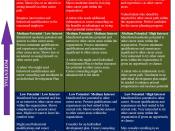IntroductionMany organizations are fond of proclaiming their dedication to the concerns of their employees. Employee handbooks generally contain a statement that in some way attests to a company's belief that its employees are its most valuable asset. However, recruiting and retaining quality employees is consistently one of the most difficult and costly tasks that any organization must undertake.
In an effort to control both the economic and opportunity costs associated with employee turnover, many organizations employ the use of employee retention strategies. Using information gathered from various peer-reviewed scholarly journals, this project focuses on the exit interview. Exit interviews are one of the components of a well-executed employee retention strategy. Our review of the available research includes a definition of the term, a discussion of the benefits and problems associated with the process, and suggestions for successfully conducting exit interviews.
Exit Interviews - Defined & QualifiedAn exit interview is a tool used by an organization to gather information from an individual who voluntarily terminates his or her employment.
These interviews attempt to assess the reasons for the individual's departure, the employee's opinion regarding a particular job function and the firm in general. In principle, exit interviews help organizations identify reasons for employee dissatisfaction and turnover. Consequently, by reviewing information gathered during these interviews, managers gain insight that leads to the development of employee retention strategies.
In practice, however, exit interviews are often either not conducted, or not conducted in a manner that produces useful data. Typically, a manager or supervisor conducts these surveys sometime prior to the employee's departure from the company. These managers are often untrained, and employees tend to provide answers that present themselves and the situation more favorably then reality would otherwise indicate. As a result, many in the business and research communities have come to question...


